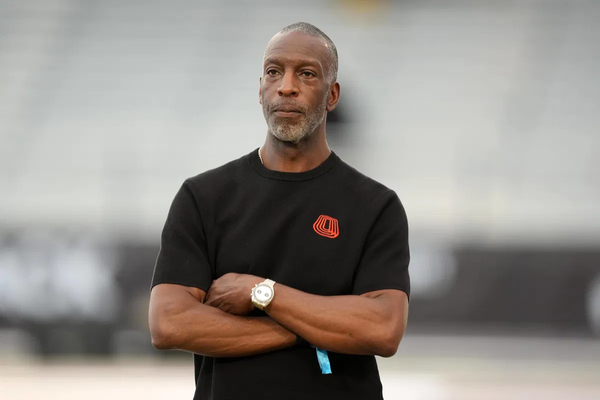
Imago
credits: Imago

Imago
credits: Imago
Michael Johnson once promised athletes that his Grand Slam Track series would change their professional lives. Instead, the experiment unraveled in less than a year, leaving millions unpaid and reputations unsettled. The fallout has reached far beyond abandoned meets and empty seats. Johnson, a trusted voice on BBC broadcasts since 2001, has now been removed from the corporation’s roster for the upcoming World Championships in Tokyo. His credibility, carefully built over decades, has collapsed under scrutiny.
Watch What’s Trending Now!
For the athletes who bought into his vision, the losses are tangible. Gabby Thomas, a two-time Olympic medalist, is owed $180,000. Sydney McLaughlin-Levrone has yet to receive $250,000. Melissa Jefferson’s figure stands at $300,000, as does Kenny Bednarek’s. Athletes who once celebrated the bold launch in Kingston now echo frustration. Thomas herself responded on a GST TikTok post with a pointed remark,“So dope! pls pay me…” capturing the exasperation of dozens of competitors still waiting on their promised rewards.
ADVERTISEMENT
That athlete discontent has now been joined by skepticism from within the sport’s old guard. On the Tidal League Podcast, Justin Gatlin questioned both Johnson’s transparency and the viability of the entire project. “I think that you are you’re being still optimistic on the situation,” Gatlin told co-host Rodney Green. “I think our platform, you know, um especially with him coming on the show and be able to speak his truth, which I felt was not full truth. Um because all these articles are coming out and the things that he said before are not aging well.”
Gatlin’s concern stretched beyond finances to Johnson’s handling of investors and the staging of the early meets. He explained, “The investors came down to Jamaica. They saw that Jamaica didn’t hit like it was supposed to hit. The stadium was empty… there was no way possible that Michael Johnson was going to get 30,000 people to fill up that Jamaican stadium. It wasn’t going to happen.”
ADVERTISEMENT
His criticism suggested that Johnson not only miscalculated but also failed to manage expectations of financial backers unfamiliar with track and field’s actual draw. Green, who co-hosted the conversation, agreed that the league had merit in concept but faltered through overreach and inadequate resources.
ADVERTISEMENT

Getty
EUGENE, OREGON – JUNE 20: Justin Gatlin looks on after the Men’s 100 Meter Final on day 3 of the 2020 U.S. Olympic Track & Field Team Trials at Hayward Field on June 20, 2021 in Eugene, Oregon. (Photo by Patrick Smith/Getty Images)
The issue, Gatlin warned, was not just operational but reputational. “Do you think this hiccup is going to hurt your legacy?” he recalled asking Johnson earlier. In his latest assessment, Gatlin concluded, “This generation that’s out now did not watch Michael run… they only know Michael as this meet promoter for the Grand Slam. So, if this Grand Slam is failing the way it is, it’s definitely going to put a dent in his legacy.” His remarks carry weight. Gatlin, himself a decorated champion, represents the very athlete community Johnson claimed to prioritize.
As for the path forward, Gatlin remained doubtful. “Do I see and when he said Grand Slam is going to be back in 2026, I don’t know. I’m kind of thinking different right now. I don’t think it’s going to be back. And if it is, it’s going to be it’s not going to look the same like it did this this season.” The statement underscored a growing consensus: that even if Johnson returns, trust among athletes has eroded. Without immediate repayments, no athlete is likely to front the series again.
ADVERTISEMENT
For now, the numbers remain stark. Nearly $19 million in obligations, abandoned venues, and a host of unsettled contracts. What was once introduced as the bold reinvention of athletics has instead become a cautionary tale. And as Gatlin put it bluntly, “Bro, fool me once, shame on you. Fool me twice, shame on me.” And amid this deepening chaos, Michael Johnson faced fresh allegations of cheating after selling tickets for a Grand Slam Track event despite knowing the league lacked sufficient funds.
ADVERTISEMENT
Michael Johnson accused of cheating over Grand Slam Track ticket sales
Michael Johnson found himself drawn into a new layer of scrutiny when a journalist accused him of cheating in relation to the handling of Grand Slam Track’s financial crisis. The charge was framed not around athletic conduct, but rather the decision to press forward with public ticket sales for the Philadelphia meet in December 2024, despite full knowledge that the league lacked the funding required to honor its obligations.
The claim turned pointed when the account @sprtrlrnnr stated, “Tickets went on sale after this occurred. $19 million not coming in as hoped, not enough to cover the season, and selling tickets anyway.” To critics, this signified a breach of trust, suggesting that Johnson had deliberately misled those purchasing seats and those preparing to compete.
ADVERTISEMENT

Imago
Credits: IMAGO
The tension escalated once athletes began to voice concerns that the official explanations offered to them were inconsistent with what had already been privately understood within Johnson’s circle. Competitors had initially been told that prize money delays were caused by drug-testing protocols, a reason that did not align with the internal debate over canceling the Philadelphia event altogether.
The suggestion that tickets were sold while the enterprise was knowingly underfunded was therefore interpreted as a calculated decision rather than an unfortunate surprise. As one observer remarked, such conduct appeared less like mismanagement and more akin to a deliberate concealment of the league’s actual condition.
ADVERTISEMENT
The accusation of cheating carried a weight that was both reputational and potentially legal. By the time Eldridge formally withdrew its support, Grand Slam Track had no plausible means of covering the promised $12.6 million prize pool, yet the promotional machinery remained active. This sequence of actions invited the argument that Johnson’s leadership had crossed from ambition into deception. For an athlete once celebrated for discipline and integrity, the allegation was particularly sharp. It suggested not merely poor judgement, but an active betrayal of the standards he had long represented.
ADVERTISEMENT
ADVERTISEMENT
ADVERTISEMENT